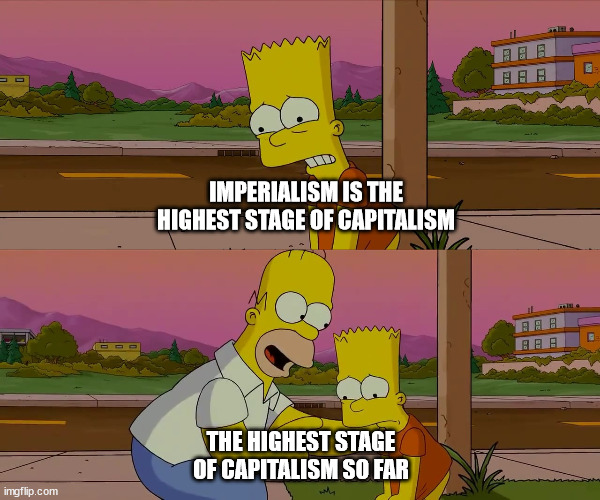(Thread IKs:
dead gay comedy forums)
|
Pener Kropoopkin posted:Germany only needs to be weakened insofar as it guarantees their dependence on the United States. Why should the US be expending all this effort to guarantee the security and profitability of these loser European crybabies who keep shoveling the proceeds of the global south into their effete and well manicured maws while risking nothing of their own to do it? These arrangements were all secured with American blood & guts. Aren't we entitled to be the master of the free world as the guarantor of its security? you have no other choice if you want to maintain capitalist rule. it's that, or socialism.
|
|
|
|

|
| # ? May 5, 2024 17:21 |
|
Zodium posted:you have no other choice if you want to maintain capitalist rule. it's that, or socialism. the gently caress there is no other choice. we’ll kill as many people as it takes no matter how counter-productive it is. you’re too invested into trying to rationalize and make sense of the world system to understand that some people really do just have reactionary and vulgar interests. we’ll kill the goose that lays the golden eggs if it means every golden egg in the world belongs to us. revolutionary moments only ever present themselves in the first place because established powers become so complacent or alienated that they’re no longer capable of stemming the tide of history. we’re holding Europe up by the ankles and shaking them out for pocket change, but no matter how often we do it they thank us for our service. so either Europe gradually declines to America’s direct benefit or there’s some kind of historical break.
|
|
|
|
well, we've certainly drawn the theoretical battle lines. time will tell. I have nothing more for now, but thank you, this was more productive than I thought it'd be.
|
|
|
|
I don't think you're wrong about this being bad for capitalism. It seems to me, based on my observations, that the American ruling class understands capitalism less and less, and the public as well by extension - because there's a complete lack of any Marxist critique in American academies and popular culture. What they know is how everything relates to their own personal interest, and if those interests are national in character, like the primary constituency of the GOP, they will assert vulgar national interests through American imperial power. The Democrats are basically the same they're just more diplomatic about it. It also wasn't enough to repress Marxism, they tried discrediting it within the terms of a Liberal framework, not understanding that Liberalism can only be understood from the outside. They don't understand what they believe and they don't know how anything actually works, because all they've done their whole life is delegate tasks and power. This is an irreversible ideological failure that will lead the United States to ruin.
|
|
|
|
on this, we are in complete agreement.
|
|
|
|
what determines whether or not capitalists, as individuals, as firms, as nations, as conglomerates, are willing or able to engage with capitalism as capitalism, and not merely reacting towards perceived trends in profitability which then emerge as aggregate behaviors of capital? because it feeeeeeeeels like maybe there are meaningful differences between contemporary capitalists' commitment to fully unshackled individual reactionary profitability-seeking behaviors and old-fashioned national bourgeoisie's ability to be directed and organized towards nation-level stability of class rule (relatively, bearing in mind that market crises provoking short-sighted crisis-exacerbating political reactions are nothing new) would the time- and place-specific composition of third classes be important determinants of particular capitalists' decision-making calculus? does relative prominence of imperially-subsidized classes impose a greater demand on that empire's bourgeoisie to commit to imperial stability as a cost of doing business with/around/through those non-proletarian classes and the potential frontiers of exploitation they might enable? wouldnt this cost on doing business simultaneously be in contradiction with capital's need to maximize profitable exploitation universally, necessitating the liquidation of these third classes, and by extension the attachments that capitalists have to imperial systems of stabilization? or is it all extremely generic and universal, and we can just say that increasing levels of capitalist economic development create increasing intensities of market crises, which produce more localized reactionary decision-making from individual capitalists as those capitalists try to stay on top of stormier waters?
|
|
|
|
|
Zodium posted:i think this makes the same reversibility error. the international bourgeoisie cannot simply pick up stake and move to america, because their power rests on the complex interdependencies of the cybernetic capitalist system, which would be fatally compromised should a part of the core be allowed to fail. the whole system must stand, or none of it will. if a core state were to become peripheralized, e.g., germany approaching south american material conditions, without the entire system collapsing, that would be a serious problem for my theory. but, correct or not, that is in the relatively distant future, in any case. I know I always end up comparing to games, but hilariously a bunch of them do end up modelling materialist systems theory pretty drat well. Anyway, looking at it from say, Anno 1800s perspective, where when you are just starting out, you build up these fairly independent islands, which produce basic goods for primarily their own consumption, and it's pretty easy to make each island profitable. The profits then also cover the maintenance of not just the islands, but also your larger faction. Ie. stuff not tied down to islands, ie. primarily your fleet of boats, later also airships and other stuff. What's interesting is that it's very easy to course correct if you end up in the red at this state of the game. Just add more houses (constant income comes from taxing your population, you can trade for rapid one-time influx) and add some more production chains to fulfil their needs so they are happy. In the game's model, the more needs you fulfill, the more tax they pay, generally. And again, this early in the game, the upkeep costs of the production chains to fulfil these basic needs is less than the taxes they pay, provided you build enough houses so you don't over-produce too much. At this state of the game, you're building primarily local systems that are, through this mechanic, resilient. Pretty soon though, you're going to run into needs that can't all be fulfilled with the resources available on a single island. Maybe your guys want schnapps requiring potatoes and beer and bread requiring grain, and you have 2 islands each with only 1 of those fertilities. So you do the Classical Economist thing and specialize each island to produce enough of each of those goods to provide for both and you set a little boat on a transport loop to ferry all this poo poo around. Everyone gets happier and pays more tax, again easily covering the expenses of both the production buildings and the boat. In fact, due to this game being made by Germans, there's no better way to get people to pay more tax than providing them alcohol of some kind. Anyway, you're just doing the same thing as in the first stage right? Wrong. You see, from this point in the game on you're basically going to keep repeating this loop where your people get ever more complex needs you're going to want to fulfil, for which you'll need more and more resources, which means you need to settle more and more islands in diverse biomes. There's Old World not-Europe, there's New World not-Latin America, there's not-Africa and there's the Arctic (it's really the arctic). And the big innovation Anno 1800 added to the series was that you can't just settle an island and pump it full of production buildings anymore. No, buildings require workers. Of the right type. Which must be sourced locally. Or well, at the very least from within the same biome. And workers from all of these biomes are eventually going to develop needs that can only be fulfilled using unique resources found only in every single one of the other biomes, and usually not just on a single island either. So you end up slowly but surely creating a vast interconnected trading network. This does two things: firstly, your maintenance overhead that is not island-based (aka, the fleet of ships to transport all this, and maybe a military fleet to protect it from AIs) balloons hard. You might even have islands where you end up putting down workers just for the (possibly really expensive) local industry and don't bother fulfilling too many of their needs, meaning these islands on their own are budget negative for your empire. Secondly, if you do this well, you are going to be making lots of money as you are fulfilling so many more complex needs giving you better classes of population which pay way more taxes. However, it also means that not a single island you have at this point in the game could exist on its own. Some of them would be so cash-negative that you'd go bankrupt and lose the game very quickly. Some of them don't even have workers on it as you're shipping them in from another island. And the rest of them would have so many needs go unfulfilled if they were cut off from your empire that people would be riotting on the streets and burning down the island very quickly. Also they'd stop paying taxes and you'd go bankrup and lose the game. OK but so what you got all these ships constantly transporting all these goods so what's the issue right? Well, there's at least 3 issues: 1. Due to the way shipping works, where an island that consumes a good it doesn't produce periodically receives a big bulk of goods and then nothing until the next ship comes in, your only resistance to supply and production shocks is having big stocks. Fortunately the game makes storage space extremely cheap, so you're not incentivized to try just-in-time shipping nonsense, so it's pretty easy to make sure you have a big buffer. Except... 2. A single production or supply shock anywhere in the system can start a chain reaction severely loving the whole system. Island A doesn't get supply of Good X, which causes it to lose population, aka workers, which causes the industry which produces Y to slow down, which causes a supply shortage of Y at Island B, etc etc. So if someone wanted to deliberately gently caress up your system (say, the AIs), they could do so by attacking any one of your islands, or even any one of your trade routes and sinking a couple trade ships. You end up having to protect *everything*, the costs of which balloon like a motherfucker (cus you gotta protect everything against a potentially serious enemy force...) and which puts a serious damper on your huge profits from fulfilling all those complex needs. And in fact so much more maintenance not being tied to islands means it becomes even more critical to make sure no island ever goes into a bad state. In fact at this point you could be losing money even if every single island you have was cash-positive. In the actual game it's not too hard to just be aggressive and permanently kneecap the AIs, but bear with me here, I'm making a point. 3. And on top of that, even absent AIs trying to deliberately destabilize your system, it's easy to gently caress yourself by merrilly focusing on developing some islands in one biome playing nice solitaire sim city gameplay just all chill growing your cities and then whoops gently caress I grew them so much that their consumption of goods produced in other biomes is now outstripping production which is causing issues not just in this biome, but in all biomes... And to make it worse, you actually hosed up an hour ago but you didn't notice because all those big stocks you had everywhere in the system were masking the problem until they ran out and now poo poo is actually quite critical. Again in the actual game, as long as you have a nice buffer of money you got plenty of time and ability to fix this and it usually won't cause a game over, and it's trivial to get a huge cash buffer by getting into a cash-positive state and then just letting the game run for a few hours or just expanding at a leisurely pace, but from a purely goods oriented perspective it's very easy to accidentally completely gently caress up your system once you get to this point of the game. Also the course correcting you have to do at this stage of the game is usually a hell of lot more complicated and involved than it was at the start. You might have to do multiple developments in multiple biomes to stabilize multiple good production chains, maybe even set up new trade routes or even add a whole new island to reach stability. All of this leads to the same conclusion: As your system gets more and more complex, with more nodes and more interconnectedness between the nodes, it also *inherently* becomes exponentially more fragile. The system grows to rely on, and indeed require, every single node and every single connection between those nodes. A single shock to any of these anywhere in the system reverberates throughout the whole thing. Only big buffers, in the form of stocks of goods or stocks of money, give you enough time to further develop a system that gets into a fail state back into a non-fail state. But note that a system that goes into a fail-state is only ever going to keep spiralling and getting worse on its own. So while you end up plateauing in a bunch of stable states whenever you are developing the system, whenever you take the next step of development, if the system goes into a fail state, it's never going to course correct and reach a stable earlier level of development. It always keeps failing until it entirely crashes and burns. Only deliberate further development can reach a new stable state. And as you develop more, there are more and more ways the system can go into a fail state. I think this is a very good way to think about the world of cybernetic capitalism and the western empire we inhabit today. The US and its suppliers was a stable state system in 1945. It obviously didn't need supplies from Europe or most of Asia, as it had been cut off from them or was moving goods only towards them rather than extracting anything, and it all worked very well. But since then there's been a lot of development. The US has become interconnected with lots and lots more places all around the world. And it needs those places to continue fulfilling their role in the system it has created, or both it and those other localities will enter a fail state. And that fail state is never going to look like a reverting back to a previous stable state, because that is fundamentally impossible. The US has counted on being the reserve currency of the world, for one example. Lots and lots of decisions have been made assuming that that is true and will remain true. If it loses its place of prominence to the point where the rest of the world doesn't trust dollars or US government bonds anymore and instead likes gold again, it's going to have a big problem it can't just walk back from. And I'm sure I don't have to explain in this thread that buffers of goods don't exist anymore in our world, and buffers of money don't actually buy you serious time outside of a game either. A buffer of labour might, but welp. So it's with this context also you gotta look at things like Taiwan and the role of the chips industry to the cybernetic network. That's one node that could easily gently caress up the whole system real bad if a shock occured to it. Hence the posturing towards China. But the shock could also be an earthquake. Or it could be China reproducing the ASML capabilities and putting up so many chip fabs that Taiwan loses its prominence in the global market. And that's just one good. The point here is that the system is fragile in more ways than you can count. This means, for example, that Ansar Allah redirecting trade around Africa has made a bunch of previously viable business non-viable, but they probably haven't figured that out yet. But they're going to, and when they do they go bankrupt, and that causes more downstream effects in the system. Same with Covid, where not only did we see that apparently the cybernetic system is so fragile it can't even produce masks outside of China, but also the shocks to the labour market still reverberating through the system and loving it up. And at least in capitalism, there's no player deliberately trying to develop it to stabilize the system. Everyone is only trying to grab as much as possible for themselves. Meanwhile China over here with development targets for 2049 and an entire bureaucracy dedicated to planning development with stability as core objective. Orange Devil has issued a correction as of 16:55 on May 4, 2024 |
|
|
|
stumblebum posted:what determines whether or not capitalists, as individuals, as firms, as nations, as conglomerates, are willing or able to engage with capitalism as capitalism, and not merely reacting towards perceived trends in profitability which then emerge as aggregate behaviors of capital? because it feeeeeeeeels like maybe there are meaningful differences between contemporary capitalists' commitment to fully unshackled individual reactionary profitability-seeking behaviors and old-fashioned national bourgeoisie's ability to be directed and organized towards nation-level stability of class rule (relatively, bearing in mind that market crises provoking short-sighted crisis-exacerbating political reactions are nothing new) if one subscribes to the idea of social character of labor, neoliberalism causes this by consequence of preferring financiers to industrialists. In industrial capitalism, the tying of productive forces with profitability means that there is a rather peculiar convergence of interests that, as a side-effect - a collateral effect - causes a rush of socio-economic development. It is collateral because class conflict happens and forces an organized political response, in which the capitalist class has to concede as a whole (otherwise why the gently caress would it work). There's a dialectical effect here which is rather obvious in hindsight, but eludes a lot of people: workers must get organized, but when that goes long enough, capitalists also lose organization in relation to the class conflict. It's not the same form of organization, of course not; it is the political relations and programs, what are the main points of interest for the economy, the overall coherence of the class, etc. Without having to fight class war or assert empire, the self-contradictions turn to the capitalists themselves as well, with consequences that can be seen right now in the form of capitalist factions pushing further friction against each other in the core
|
|
|
|
one of the big theoretical disagreements between lenin and kautsky was whether there would come to be a "super-imperialism" that saw all capitalists united across the globe in mutual profit extraction across a global market such that international war became a thing of the past. we saw how well that worked out i'm skeptical that kautsky's prediction will come about a hundred years later thanks to advances in computation and signal transmission. capital needs a democratic-republican (at least in name) state around itself to act as a protective shell, and both private property and the states that defend it have to rest on solid ground in definite locations. so while i AM partial to treating capital as a lovecraft monster or intestinal parasite, i think its international power specifically rests on NATO and hence american global hegemony. i do think zodium's right that americans themselves, on average, are going to suffer more and more to maintain this global hegemony because any steps to rationalize the system or mitigate its harma would mean a defiance of capital's primal urges, urges which the actual specific people populating our ruling class are worse and worse at understanding but no less vulnerable to being pushed around by
|
|
|
|
dead gay comedy forums posted:There's a dialectical effect here which is rather obvious in hindsight, but eludes a lot of people: workers must get organized, but when that goes long enough, capitalists also lose organization in relation to the class conflict. It's not the same form of organization, of course not; it is the political relations and programs, what are the main points of interest for the economy, the overall coherence of the class, etc. Without having to fight class war or assert empire, the self-contradictions turn to the capitalists themselves as well, with consequences that can be seen right now in the form of capitalist factions pushing further friction against each other in the core Inter-class struggle vs intra-class struggle.
|
|
|
|
Ferrinus posted:this does mean that the $40 delta between the capitalist's costs and the coat's price represents surplus value captured by the capitalist through exploitation. it also means the rate of surplus value is a whopping 400%; i can pay someone $10 to get them to generate $50 of value for me, so every dollar i spend on labor comes back to me fourfold. on the other hand, my rate of profit is merely 25% (i put $160 into the production process and end up with $200, so every dollar i invest only spawns 25 cents on top of itself), so i, the capitalist, feel like i'm benefiting from exploitation to a much lower extent than my own workers feel they're being exploited. this is an incredibly useful analysis of something that's been sort of lurking under the surface of my understanding. thank you.
|
|
|
|
Orange Devil posted:And at least in capitalism, there's no player deliberately trying to develop it to stabilize the system. It's because capitalism is not emergent for stability in the way we regard it, yeah. Also very important reminder that the capitalism of 1945-50 and something was completely different in ways, means, purpose and more. Keynesian thought and the entrepreneurial state had proven themselves during the war and subsequent phases. Those adaptations, the alternative schools of economic thought - represented by people like Schumpeter, Myrdal, Veblen, etc etc - were necessary consequences for preservation of structure after the world wars and revolutions. This was a period of diminished capitalism-as-it-is, which got a substantial part of the American capitalist class unbelievably spiteful and seething with hatred, even though the Western markets (with the colonies) were simply given in a platter to them. They are the ones who come up with John Birch Society and everything else, the faction of capital that doubles down on "not enough" and reasserts its awful forces against these adjustments of containment and function. (I cannot overstate this: the state presence of any NATO country of today into the economy of that time would make a neoliberal shrill recoil in abject horror) dead gay comedy forums has issued a correction as of 17:27 on May 4, 2024 |
|
|
|
Orange Devil posted:Inter-class struggle vs intra-class struggle. and I think the financiers are far more likely to be mercenary and factional than the industrialists, but this is just an educated guess as I don't recall anything specific to that in literature
|
|
|
|
Well financiers are more rootless. Their capital in the end is just numbers on spreadsheets. It can be here one moment and there the next. The industrialist can move his factories, sure, but that costs a lot more time and capital. So he has some sunk costs to contend with. And even when he moves it, he requires a whole bunch of material things to exist in the right combinations to be able to extract profit. Infrastructure, labour, raw materials, market access, a state that can provide security, a means to communicate in accordance with local language and customs.
|
|
|
|
Pener Kropoopkin posted:I don't think you're wrong about this being bad for capitalism. It seems to me, based on my observations, that the American ruling class understands capitalism less and less, and the public as well by extension - because there's a complete lack of any Marxist critique in American academies and popular culture. What they know is how everything relates to their own personal interest, and if those interests are national in character, like the primary constituency of the GOP, they will assert vulgar national interests through American imperial power. The Democrats are basically the same they're just more diplomatic about it. It also wasn't enough to repress Marxism, they tried discrediting it within the terms of a Liberal framework, not understanding that Liberalism can only be understood from the outside. This is pretty much what I think, and why what I defined as the American empire will crumble within a few decades. And yes, something new will replace it, but I guess my original objection was the idea that American relevance ended a lifetime ago when that only really started happening very recently in the past few decades.
|
|
|
|
Great replies, I have the next part writing. I'm going to keep my phrasing consistent - I'm more concerned about comparing mk 1 to mk 2 next, I definitely over simplified. Before I do - Orange, you have some great replies, but that Anno video game post could create confusion around the machine portion. I think that specific reply is more related to video games than real life. When I hit this next part, I'd just like to avoid a game comparison to it. I also might have it wrong of course. (USER WAS PUT ON PROBATION FOR THIS POST)
|
|
|
|
Machine Mk 2. A new idea has allowed Mk 2. To be created for the same $500 in materials and $500 in labor. But this machine creates 20 coats before it breaks down, unrepairably, not 10. Capitalist Bezos, the coat competitor, has an easy choice as he enters the market, of course he'll buy Mk 2, he gets twice as many coats from this expensive machine, and labor still only costs $10/day and uses $50 in materials. These coats consist of 1/20th of the machine ($50) plus materials ($50) plus labor ($10) or $110. But still sell at the market rate of $200! So capitalist Bezos has $90 of surplus value. And a rate of surplus of 900%! The rate of profit in this case has even increased to 45%. This is comparing the first coat to the first coat, and I'm very purposefully keeping the machines at 1 coat a day equally. And once again I'm ignoring any labor exploitation in the creation of the machine, I only care about the coat making capitalists and their exploitation.
|
|
|
|
BillsPhoenix posted:Machine Mk 2. A new idea has allowed Mk 2. To be created for the same $500 in materials and $500 in labor. But this machine creates 20 coats before it breaks down, unrepairably, not 10. i think you're using a term wrong. the rate of surplus value, the ratio between s and v, is still 400%, because a day of work still creates $50 of value but the labor-power a day of work burns only costs $10 (ie one fifth of the working day) to reproduce. bezos, our new character, is still buying $10 worth of labor and watching it turn into $50 worth of coat, and that's the basis of his surplus however, his profit actually exceeds the surplus value generated by his workers because he's in the honeymoon period of being an early adopter of improved technology. human society still thinks coats are best produced with the mk1, and therefore that they ought to cost $200. when bezos stamps out a coat at only a 50 materials + 50 machine depreciation + 10 = $110 cost to himself, and sells it for $200, he's capturing $40 of surplus value generated by his own workers and $50 more dollars of value that the market at large is giving him gratis. we can understand this as the profit of trickery or a reward for innovation and technical development, i can leave this question aside for now either way, bezos's rate of profit is currently a princely 90/110 = ~81%, even though the rate of surplus value has not changed! unfortunately, this will not last. eventually the mk2 will become industry standard and the prosaic effects of supply and demand will reduce the market price of a coat to 50 materials + 50 machine wear + 50 value generated by the full workday = $150. so, five or ten years down the line, bezos will lay out $110 of capital, wind up with a $150 coat, and enjoy a 40/110 = ~36% rate of profit. this is still strictly superior to what he had before, which makes sense since the move from mk1 to mk2 was a matter of pure materials savings resulting in strictly superior efficiency than before without any kind of tradeoff between capital investment, time saved, labor required, or whatever else
|
|
|
|
what's that looming on the horizon? is it the spectre of overproduction riding the crest of the decennial cycle of crisis?
|
|
|
|
Ferrinus posted:either way, bezos's rate of profit is currently a princely 90/110 = ~81%, even though the rate of surplus value has not changed! This postulates competition in the market, which is very much a liberal economics position. If Bezos uses his first mover advantage to eliminate most competition and cooperates with the rest no decrease in price is required particularly if barriers to entry are raised, which mature industries make a habit of doing. Foreign competition is one government bribe from being tariffed away.
|
|
|
|
Complications posted:This postulates competition in the market, which is very much a liberal economics position. If Bezos uses his first mover advantage to eliminate most competition and cooperates with the rest no decrease in price is required particularly if barriers to entry are raised, which mature industries make a habit of doing. Foreign competition is one government bribe from being tariffed away. well yeah, the basic c + v -> c + v + s stuff takes as a given core liberal assumptions about fair and free trade, among other reasons to show that exploitation is inherent in profit even if everyone is playing fair. obviously, everyone is NOT playing fair, so we can expect bezos to do his best to monopolize the coat business and otherwise slow down or even paralyze the market's ability to find a coat's new value. if he succeeds at that, though, the bonus value he captures over that of his own workers comes, ultimately, from other workers, either directly (they are overpaying for coats) or indirectly (they are capitalists who are overpaying for coats, but the money they are using to do so came from other workers being exploited) Ferrinus has issued a correction as of 01:28 on May 5, 2024 |
|
|
|
good posting all round lads
|
|
|
|

|
| # ? May 5, 2024 17:21 |
|
theres even a guy who wrote about this https://www.marxists.org/subject/africa/nkrumah/neo-colonialism/introduction.htm
|
|
|





















